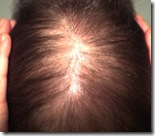Telogen Effluvium
 Telogen Effluvium, also known as nonscarring alopecia, is a medical term that stands for excessive hair loss or hair shedding, which is not directly related to natural causes, such as aging. The hair loss has a diffuse character and usually starts abruptly, or, in medical terms, it has an acute onset.
Telogen Effluvium, also known as nonscarring alopecia, is a medical term that stands for excessive hair loss or hair shedding, which is not directly related to natural causes, such as aging. The hair loss has a diffuse character and usually starts abruptly, or, in medical terms, it has an acute onset.
Later on, especially in women, the condition can turn into a chronic form, which is characterized by slow, gradual, and persistent hair shedding that may last for years. However, in most cases, the diseases resolves spontaneously within a period of about 6 months.
Telogen Effluvium can be triggered in young or middle-aged people of both genders by the following factors:
• pregnancy or childbirth in women, especially accompanied by malnutrition;
• severe infections or chronic diseases, such as AIDS, systemic lupus erythematosus, liver disease, or some types of cancer, including lymphoproliferative malignancy;
• crash diets, that are inadequate in protein, iron and essential fats, anorexia, or starvation;
• severe or chronic forms of psychological, hormonal, or metabolic stress,
• imbalances in the work of the thyroid gland, with can manifest as hypothyroidism or hyperthyroidism;
• side effects of some types of medication, such as beta-blockers, retinoids, immunizations, or large doses of synthetic Vitamin A;
• papulosquamous scalp disorders, such as seborrheic dermatitis, eczema, allergic contact dermatitis, or psoriasis;
• sudden discontinuation of estrogen-containing medications;
• severe cases of chemical poisoning, especially by such heavy metals as selenium or thallium; or
• major surgery or trauma.
Any of the above factors can disrupt the hair follicles anagen, or “growing”, phase, which, in a period of a few months, results in hair fallout during the telogen, or “resting” phase. Hair growth phases, or cycles, usually last about 3 years for the anagen phase, and about 3 months for the telogen phase. Most people have roughly 10% of their scalp hair in the telogen phase, and about 90% - in anagen. Those hairs disrupted during the anagen phase fall during their resting phase, thus creating diffuse areas of scalp baldness. This condition can affect all body hair, but scalp hair loss is usually more symptomatic and noticeable. A normal rate of scalp hair fallout in a healthy person is about 100 hairs a day, but in cases of Telogen Effluvium the patient may shed off up to 300 hairs daily.
This type of alopecia is common around the globe, and it is estimated that a great percentage of people have experienced acute Telogen Effluvium in some time during their lives. The condition is not dangerous, but it points out on some imbalances, diseases, or stress existing in the organism of the affected person. In addition, it caused cosmetic concerns, especially in women, and can lead to the developing of low self-esteem, social phobias, and related psychological disorders.
Treatment of Telogen Effluvium depends on identifying and curing of the basic cause. As the condition has a reactive nature, it often resolves spontaneously and rapidly when the cause is eliminated. In the meanwhile, patients, especially women, are advised to style their hair in a way that masks the areas of shedding. Topical Minoxidil is a medication that is recommended for facilitating the process of spontaneous hair growth remission in Telogen Effluvium. Hair transplants are not considered effective. Dietary therapy can be very helpful, especially if it emphasizes the intake of protein, essential fatty acids, naturally occurring iron, and other valuable nutrients.
Robin Makris
Posted on October 12, 2007
Filed Under Hair Loss Conditions
Comments
Leave a Reply